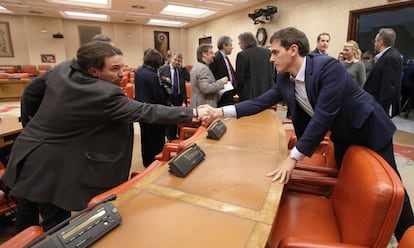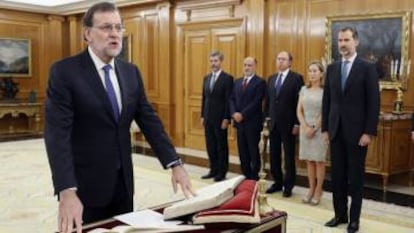A year on from elections, Spain’s new parties fight to stay relevant
Podemos and Ciudadanos have been effectively sidelined in the new Congress
It has been a year since the general election of December 20, when Spain’s new protest parties Podemos and Ciudadanos secured a spot in Congress. But the excitement has gradually given way to weariness among voters, and both parties are now fighting to remain relevant in national politics.

Although their stated goal was to end the two-party system that has characterized Spanish politics since the democratic transition of the late 1970s and early 1980s, the fact is that the Popular Party (PP) and the Socialist Party (PSOE) continue to be the first- and second-biggest forces in parliament.
Citizens have gradually lost their high hopes for meaningful change
In the meantime, leftist Podemos finds itself in congressional isolation, while the reform-oriented Ciudadanos is struggling to prove that its agreement with the PP is truly meaningful.
“What’s happening with Podemos and Ciudadanos is the result of parties that once represented hope for new politics transitioning into a state of disappointment over the failure of their deal-making,” says Ángel Valencia, a professor of political science at Málaga University.
“In both cases, their politics have been rather unexciting. While Ciudadanos has played the role of the party that holds the balance of power, reaching deals with the PP and PSOE that could not be honored because they did not lead to governments in and of themselves, Podemos has been ambiguously opening up to the PSOE,” Valencia explains.
Podemos, born out of Spain's 15-M protest movement, once rode the top of the polls in Spain with 28% of voters saying they would cast their ballot for the party in January 2015, according to pollster Metroscopia. And just a month shy of the December 20 election, Ciudadanos was just one-tenth of a point away from the PP in the polls (22.6%).
That inconclusive election opened up months of fruitless negotiations, led to a repeat election on June 26, a fresh political stalemate, and an 11th-hour decision by the Socialists to allow a minority PP government that narrowly averted a record third national election.

At the end of it all, the mood among Spanish voters has changed radically. According to pollster Metroscopia, support for Podemos now stands at 22.9%, making it the second-strongest force, while backing for Ciudadanos is 14.5%. And both party leaders – Pablo Iglesias for Podemos and Albert Rivera for Ciudadanos – get a failing grade from voters.
“The repeat election of June 26 went down very badly,” notes Pablo Simón, a lecturer in political science and member of Politikon, a nonpartisan think tank. “Podemos wants the other three parties to vote as one as often as possible, in order to illustrate what it calls the Triple Alliance and underscore its own role as the opposition. But they run the risk of being seen as doing nothing, as being useless, just something of a vociferating mass that protests over everything and has trouble building bridges.”
Meanwhile, adds Simón, Ciudadanos is the weakest link because it is highly vulnerable to strategic voting.
“If it does not make it into government, it gets left half-in and half-out, and fails to show how it is being useful, thus exposing itself to a new blow at the polls.”
After watching the new challengers vetoeing one another and spending more time discussing internal issues than home evictions, jobs or corruption, citizens have gradually lost the high hopes they had for meaningful change.
In the 12 opinion polls conducted by Metroscopia from January 2015 to January 2016, more respondents felt the political situation would improve than get worse. That was an exceptional attitude in a series marked by pessimism.
The repeat election of June 26 went down very badly Political scientist Pablo Simón
A year later, the optimism has vanished: the November 2016 Metroscopia poll showed 15% of optimists versus 26% of pessimists. A further 40% feel that everything is going to stay the same.
Nobody knows what will happen with the upstart parties now that they are part of the system. The true test will come in 2019, a year of local, regional and European elections.
English version by Susana Urra.
Tu suscripción se está usando en otro dispositivo
¿Quieres añadir otro usuario a tu suscripción?
Si continúas leyendo en este dispositivo, no se podrá leer en el otro.
FlechaTu suscripción se está usando en otro dispositivo y solo puedes acceder a EL PAÍS desde un dispositivo a la vez.
Si quieres compartir tu cuenta, cambia tu suscripción a la modalidad Premium, así podrás añadir otro usuario. Cada uno accederá con su propia cuenta de email, lo que os permitirá personalizar vuestra experiencia en EL PAÍS.
¿Tienes una suscripción de empresa? Accede aquí para contratar más cuentas.
En el caso de no saber quién está usando tu cuenta, te recomendamos cambiar tu contraseña aquí.
Si decides continuar compartiendo tu cuenta, este mensaje se mostrará en tu dispositivo y en el de la otra persona que está usando tu cuenta de forma indefinida, afectando a tu experiencia de lectura. Puedes consultar aquí los términos y condiciones de la suscripción digital.








































